Today, I’m going to be talking about setting up camp, and not just any camp, but one that could rival a seasoned campers. Camping is about more than just unrolling a sleeping bag and hoping for the best. It’s about creating a home base in the wilderness that lets you enjoy the beauty of nature with as little hassle as possible.
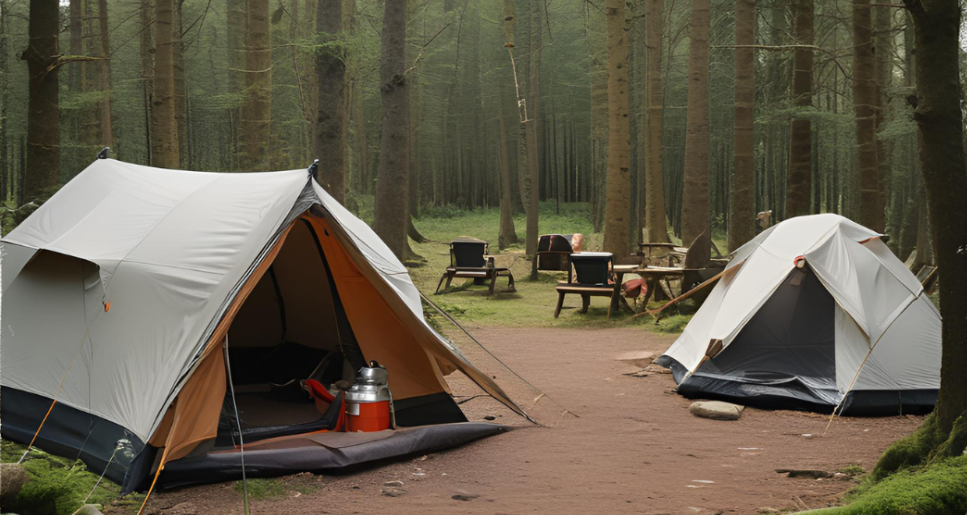
You’re going to find out about how choosing the right spot for your tent will make your camping trip safer and more enjoyable. I’ll share tips that cater to every camper’s needs, whether you’re a complete novice or someone looking to refine their camping skills. By the time we’re done, you’ll know how to set up a campsite that is both practical and comfortable.
That’s going to include everything from spotting the perfect location to how to lay your tarp. But before we get into the nitty-gritty of knots and poles, I really hope that you’ll come to see that a well-set camp is your gateway to appreciating the tranquil mornings and awe-inspiring nights that nature has to offer.
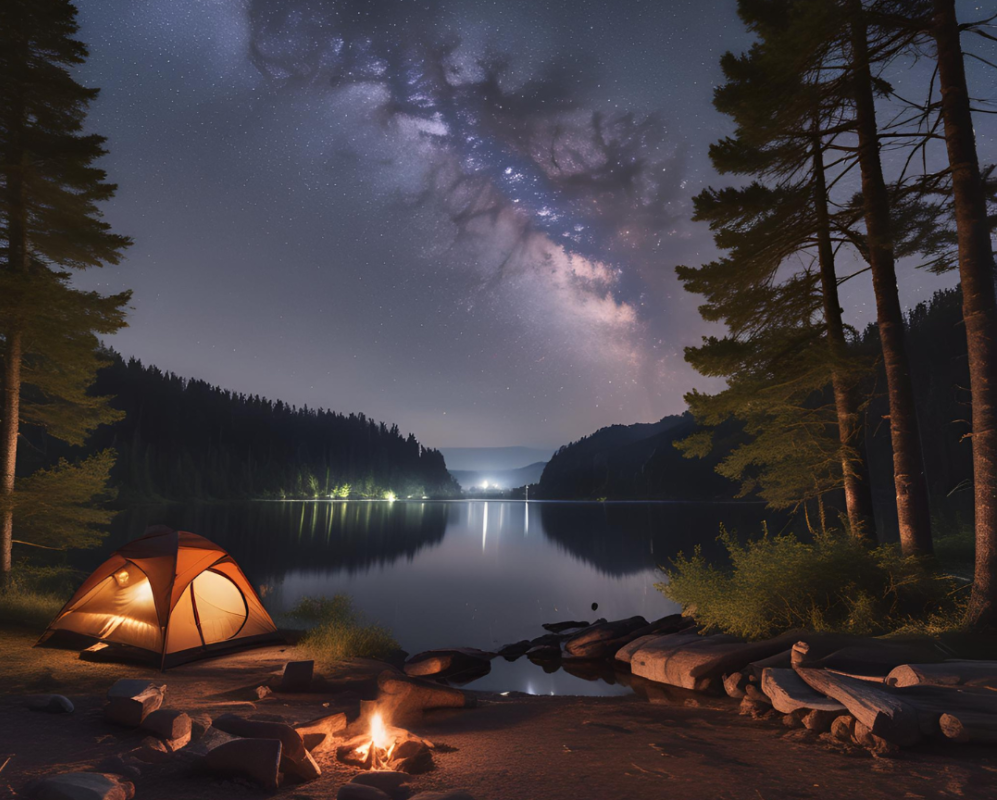
This isn’t just about pitching a tent, it’s also about respecting the environment you’re temporarily calling home. You’ll learn the dos and don’ts of camping that make sure you leave no trace and keep the great outdoors, well, great. Now, let’s move on to choosing an ideal campsite, the foundation of your outdoor adventure.
Choosing the Ideal Campsite
Imagine waking up to the gentle rustle of leaves and the first golden rays peeking through the treetops. That’s the start of a perfect day at your ideal campsite. But here’s the catch: finding that spot doesn’t happen by chance. It’s about making informed decisions and knowing what to look for.
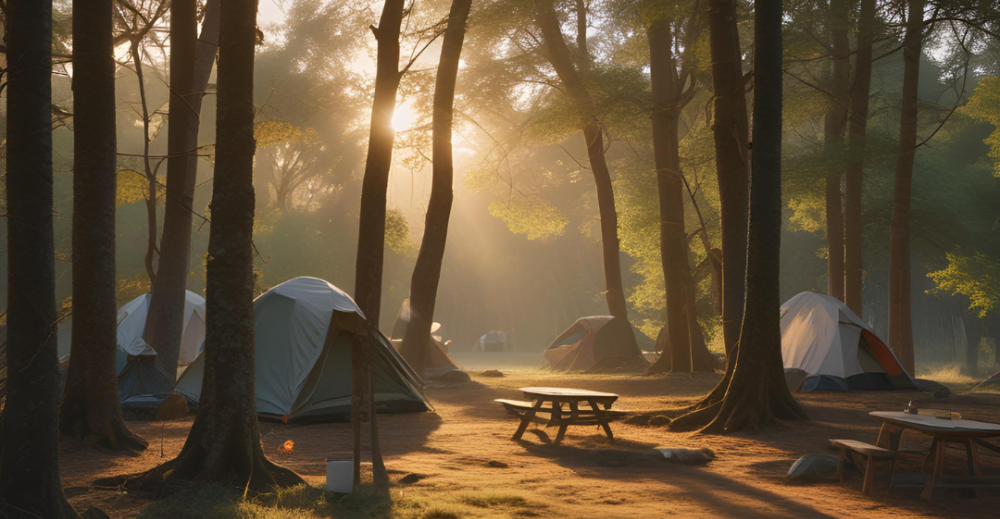
Let’s start with location. A top-notch campsite blends accessibility with pristine nature. Research parks and camping areas, read reviews, and know the regulations. Look for sites that aren’t too close to trails or heavy foot traffic, keeping the noise and disruptions to a minimum. Accessibility for your vehicle and proximity to park facilities can also sway your choice, depending on what type of camping experience you’re after.
Next, I’m going to tell you about terrain and shelter. Aim to pitch your tent on level ground. A slight elevation is always a plus for drainage purposes, just in case mother nature decides to throw a rain party. Look around and above for ‘widow-makers’ – dead branches that can fall and cause serious harm. Maintaining a safe distance from precarious cliffs and avoiding the bottoms of hills and valleys where water may pool is just as crucial.
Water sources are a blessing, but only if you respect their boundaries. A campsite about 200 feet from rivers or lakes is ideal. It’s close enough for convenience but far enough to prevent any contaminating runoff from your campsite. And don’t forget privacy. While sociability can be a part of the camping charm, choosing a spot with some natural barriers allows for a serene escape.
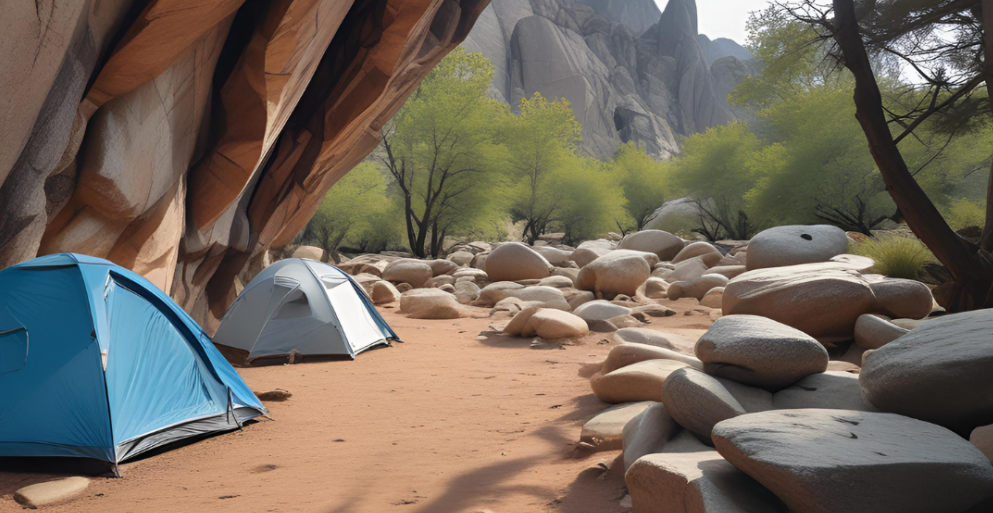
In the next section, I’m going to walk you through setting up your home away from home, where you’ll learn the tricks to pitching your tent with precision and organizing your space for optimum campsite living.
Setting Up Your Home Away From Home
Imagine waking up to a gentle breeze and the soft sounds of nature right at your doorstep. That’s the promise of a well-set-up campsite. You’re going to find out about seamlessly transforming a patch of the wild into your personal retreat.
First off, let’s talk tents. You want a sturdy shelter over your head, so choose something that resonates with you in terms of comfort and ease of setup. Start by clearing the ground of debris, lay down a tarp as an extra moisture barrier, and pitch your tent with the entrance facing away from the wind.
Once your tent is up, think about the layout. Position your cooking area downwind to avoid smoke wafting into your sleeping quarters. A place for washing, a spot for sitting, and where you’ll store your food away from animals are also key areas to consider.
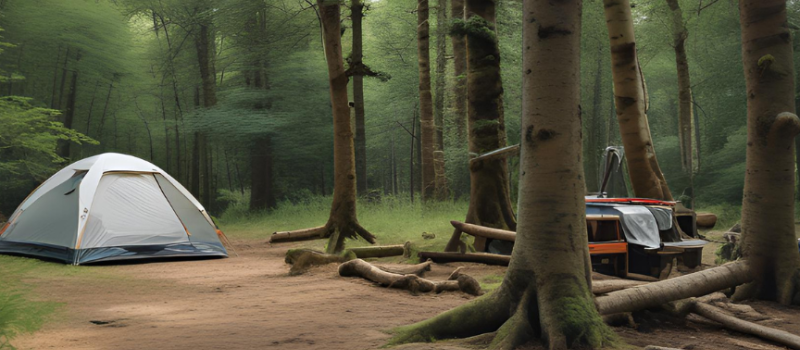
Speaking of food, proper storage is crucial. Wildlife can be attracted to your food, and this isn’t just about safety, it’s also about respecting the creatures that call your campsite home. Use animal-proof containers or hang your food high in a tree well away from your tent.
And finally, be a good neighbor. Follow the Leave No Trace Principles, which include disposing of waste properly, leaving what you find, and minimizing campfire impacts. Keep noise levels down and lights low, so everyone can enjoy the peace of nature.
In my opinion, a thoughtfully organized campsite not only enhances your comfort but also safeguards the environment. Now that your campsite is all set, in the next section we’ll dive into ensuring your safety and maintaining etiquette, vital components of any outdoor adventure.
Campsite Safety and Etiquette
Camping is about more than just enjoying the solitude and beauty of nature. It’s also about maintaining a safe environment for you, your fellow campers, and the wildlife you share the space with. That’s why campsite safety and etiquette are paramount. A roaring campfire might be the quintessential camping image, but it’s important to understand fire safety rules. Always use designated fire rings, keep fires small to prevent spread, and ensure your fire is completely extinguished before you turn in for the night or leave the site.
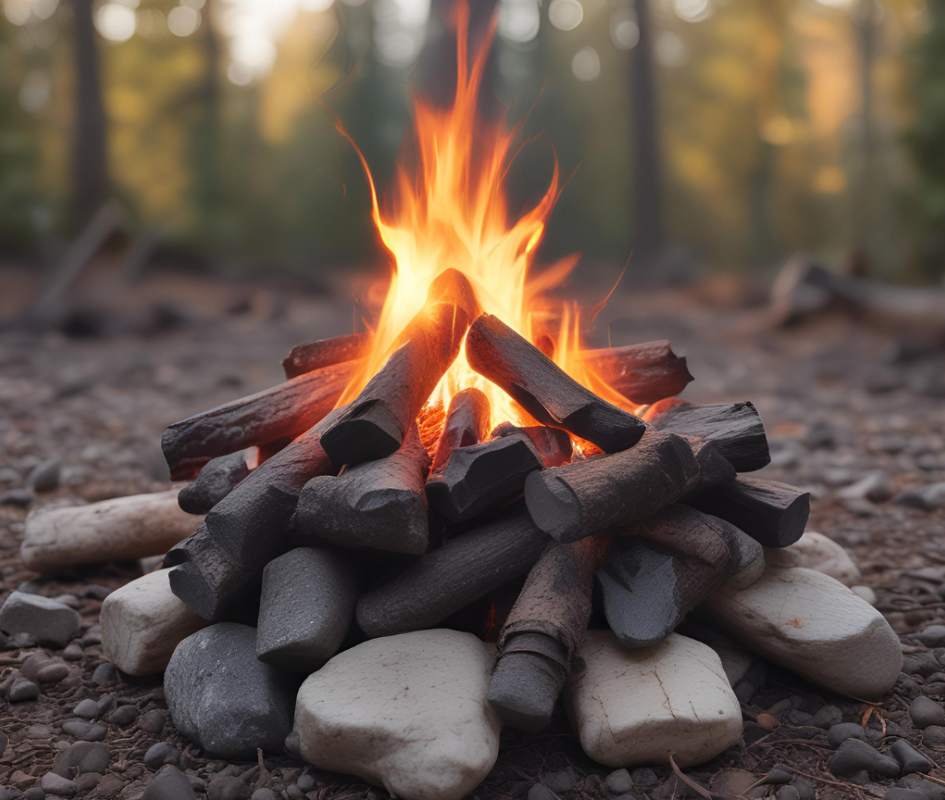
Food management is equally critical. You’re going to want to store your food securely to avoid attracting animals. This means using animal proof containers or hanging your food out of reach when in the wilderness. Remember, animals have a keen sense of smell, and even the smallest crumbs can lure them into your site.
Interacting with wildlife should be done so with respect and caution. Feeding animals is a definite no-go—it’s harmful to their health and can make them a nuisance for future campers. Always observe animals from a safe distance and store your trash properly to protect the natural habitat.
Lastly, the unwritten camper’s code of conduct revolves around leaving the campsite better than you found it. This includes cleaning up after yourself, respecting the quiet hours of campgrounds, and being considerate of your camping neighbors and their space. Stick to established trails to prevent erosion and share the trails with courtesy to everyone you meet.
By following these tips, you’re not just setting up camp like a pro—you’re preserving the outdoor experience for everyone. It’s about being conscious of and taking responsibility for our shared natural resources. So next time you unzip your tent and step out into the early morning light, take a moment to appreciate the unspoiled beauty around you, and remember the part you’ve played in keeping it that way.
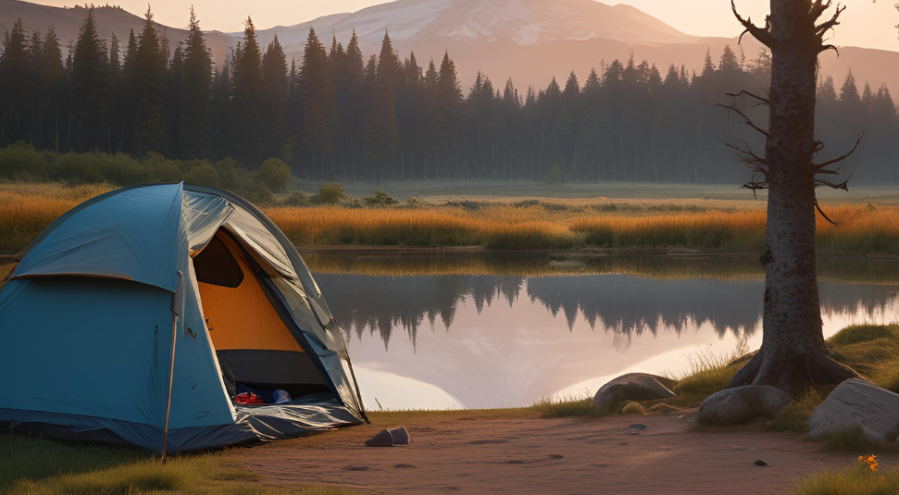
Happy Camping!
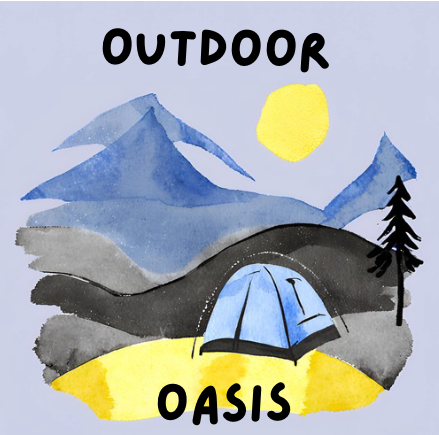
Thank you for sharing these detailed tips! I found the advice about choosing the ideal campsite VERY helpful!
I’ve often struggled with finding the perfect balance between accessibility and tranquility. Your suggestions about researching, looking for level ground, and considering water sources are going to be invaluable for my future trips. Also, the emphasis on respecting nature and wildlife was amazing. Can’t wait to put these insights into practice and make my camping experiences even more enjoyable while being mindful of the environment.
Keep up the fantastic work!
Thank you for your positive feedback on my post about choosing the ideal campsite for camping! I’m delighted to hear that you found the tips helpful and relevant to your future trips. It’s great to know that the advice on finding the perfect balance between accessibility and tranquility, researching, seeking level ground, and considering water sources resonated with you. I’m glad that the emphasis on respecting nature and wildlife was valuable to you as well. It’s wonderful to hear that you’re looking forward to implementing these insights to enhance your camping experience while being mindful of the environment. Your support and encouragement mean a lot to me, and I appreciate your kind words. If you have any more questions or need further assistance, feel free to reach out. Wishing you many enjoyable and environmentally conscious camping adventures ahead!
Happy Camping!
Camping like a pro will be very interesting for people who are beginners and don’t know where to start. indeed, you must lovenatyure and be willing to wake up in beautiful places. personally, I camped when I was a teenager and I liked looking the sky and count the stars. it was a way to manifest my dreams without knowing haha!
Camping has this magical way of connecting us with nature and our inner selves, doesn’t it? Your experience as a teenager, counting stars under the open sky, beautifully captures the essence of what makes camping so special. It’s not just about the practical skills; it’s about finding solace and wonder in the great outdoors. Whether you’re a beginner or seasoned camper, that feeling of waking up surrounded by nature’s beauty is truly unforgettable. Thanks for sharing your nostalgic camping memory—it’s stories like yours that inspire others to embark on their own outdoor adventures!
Happy camping and star-gazing!
Best regards, Graham